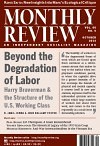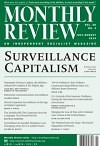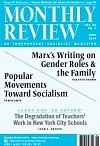Marxism
Foreword to The Necessity of Social Control
István Mészáros is one of the greatest philosophers that the historical materialist tradition has yet produced. His work stands practically alone today in the depth of its analysis of Marx’s theory of alienation, the structural crisis of capital, the demise of Soviet-style post-revolutionary societies, and the necessary conditions of the transition to socialism. His dialectical inquiry into social structure and forms of consciousness—a systematic critique of the prevailing forms of thought—is unequaled in our time. No less a historical figure than Hugo Chávez referred to him as the “pathfinder” of twenty-first century socialism.… The role of this foreword is to help to put his system of thought as a whole, and this book in particular, in their historical contexts, while illuminating some of the distinctive concepts governing his analysis. | more…
Not since the Great Depression of the 1930s has it been so apparent that the core capitalist economies are experiencing secular stagnation, characterized by slow growth, rising unemployment and underemployment, and idle productive capacity. Consequently, mainstream economics is finally beginning to recognize the economic stagnation tendency that has long been a focus in these pages, although it has yet to develop a coherent analysis of the phenomenon. Accompanying the long-term decline in the growth trend has been an extraordinary increase in economic inequality, which one of us labeled “The Great Inequality,” and which has recently been dramatized by the publication of French economist Thomas Piketty’s Capital in the Twenty-First Century. Taken together, these two realities of deepening stagnation and growing inequality have created a severe crisis for orthodox (or neoclassical) economics. | more…
Multitude or Generalized Proletarianization?
The term multitude was first used in Europe, it seems, by the Dutch philosopher Spinoza, to whom Michael Hardt and Antonio Negri explicitly refer. It then designated the “common people” who were a majority in the cities of the Ancien Régime and deprived of participation in political power (reserved for the monarch and the aristocracy), economic power (reserved for property owners of feudal ancestry or for the nascent financial bourgeoisie, both urban and rural—including the rich peasants), and social power (reserved for the Church and its clerics). The status of the common people varied. In the city, they were artisans, small merchants, pieceworkers, paupers, and beggars; in the country, they were landless. The common people in the cities were restless and frequently exploded into violent insurrections. They were often mobilized by others—particularly the nascent bourgeoisie, the active component of the Third Estate in France—in their conflicts with the aristocracy. | more…
Marge Piercy is the author of eighteen poetry books, most recently The Hunger Moon: New & Selected Poems, 1980–2010 (Knopf, 2011). Her most recent novel is Sex Wars (Harper Perennial, 2005) and she has just published her first collection of short stories, The Cost of Lunch, Etc. (PM Press, 2014). | more…

Secular stagnation (or the trend towards long-term slow growth and continuing high unemployment/underemployment) has become a big issue in the mature economies since 2013, when former U.S. Treasury Secretary Larry Summers raised the question at an IMF economic forum. Compilations of work on the subject can now be found on the Internet, such as the one by economists Coen Teulings and Richard Baldwin; which however leaves out all contributions by heterodox economists. Teulings and Baldwin credit Summers with having “resurrected” the secular stagnation issue. But is this true? Only in the sense that he reintroduced it to mainstream neoclassical economics. It has long been a topic on the left, and particularly in Monthly Review, where editor Paul Sweezy explicitly drew attention to the “secular stagnation” question more than forty years ago—with MR tracking the stagnation trend month by month in the four decades that followed.… Isn’t it about time…that orthodox economists, Summers included, began to acknowledge the enormous work done on this topic on the left over decades, and indeed the greater complexity and historicity of the analysis to be found there—not only in MR but within heterodox economics more generally? Such an admission might even do orthodox economists some good. | more…
Cal Winslow, ed., E.P. Thompson and the Making of the New Left: Essays & Polemics (New York: Monthly Review Press, 2014), 333 pages, $23.00, paperback.
It is surely difficult for young people today to grasp that thirty years or so ago, radical historian-activist Edward Thompson was by opinion polls intermittently the second or third most popular person in England, just after the Queen Mother. This was despite the British establishment, to say nothing of U.S. Cold Warriors (liberal or conservative), slandering him for decades—and why not? He had led massive protest movements of ordinary people against their government. Worse, in cloistered academic quarters he was viewed as having reorganized the whole idea of social history and turned it over to ordinary people! More than anyone else in the English-speaking world, he made the history of such people important. | more…
It is not by chance that the very title of this contribution links the return of fascism on the political scene with the crisis of contemporary capitalism. Fascism is not synonymous with an authoritarian police regime that rejects the uncertainties of parliamentary electoral democracy. Fascism is a particular political response to the challenges with which the management of capitalist society may be confronted in specific circumstances. | more…
Fred Block responds to the Notes from the Editors, June 2014, which drew attention to Block’s recently published article, “Varieties of What?: Should We Still Be Using the Concept of Capitalism?” The editors reply. | more…

Allusions to Marx seem to be emanating from all points of the political compass these days in the context of the current political-economic crisis of capitalism, reflecting the remarkable resurgence of both Marxism and anti-Marxism. What is especially notable in this respect is the extent to which such allusions have come to focus on the saying, “from each according to his ability, to each according to his needs”—usually identified with Marx’s famous 1875 Critique of the Gotha Programme. Conservatives frequently quote “from each according to his ability” (ignoring the rest of the saying) and use it as a kind of code phrase for “Marxism” to attack all progressive measures. | more…

Samir Amin’s Review of the Month in this issue, “Popular Movements Toward Socialism,” offers a masterful analysis of struggles all over the world in the era of what he calls “generalized-monopoly capitalism.” The most important theoretical innovation in his article, in our opinion, is his attempt to bring together a variety of global struggles under the rubric of the “movement toward socialism,” borrowing the terminology from the current practice of a number of South American parties: in Bolivia, Chile, and elsewhere. Movements that fall under this mantle, Amin suggests, may include those that seek to transcend capitalism, as well as others for which the object is more ambiguously a radical upending of labor-capital relations. | more…
The following reflections deal with a permanent and fundamental challenge that has confronted, and continues to confront, all popular movements struggling against capitalism. By this I mean both those of movements whose explicit radical aim is to abolish the system based on private proprietorship over the modern means of production (capital) in order to replace it with a system based on workers’ social proprietorship, and those of movements which, without going so far, involve mobilization aimed at real and significant transformation of the relations between labor (“employed by capital”) and capital (“which employs the workers”).… Taken as a whole, many of these movements can be termed “movements toward socialism.” | more…
In recent years, there has been little discussion of Marx’s writings on gender and the family, but in the 1970s and ’80s, these writings were subject to a great deal of debate. In a number of cases, elements of Marx’s overall theory were merged with psychoanalytic or other forms of feminist theory….These scholars viewed Marx’s theory as primarily gender-blind and in need of an additional theory to understand gender-relations as well. However, they retained Marx’s historical materialism as a starting point for understanding production. Moreover, a number of Marxist feminists also made their own contributions in the late 1960s to ’80s, particularly in the area of political economy [when they] tried to revalue housework. [Others] attempted to move beyond dual systems towards a unitary understanding of political economy and social reproduction [or show] that Marx can be used to understand the historical development of women’s nature. | more…


